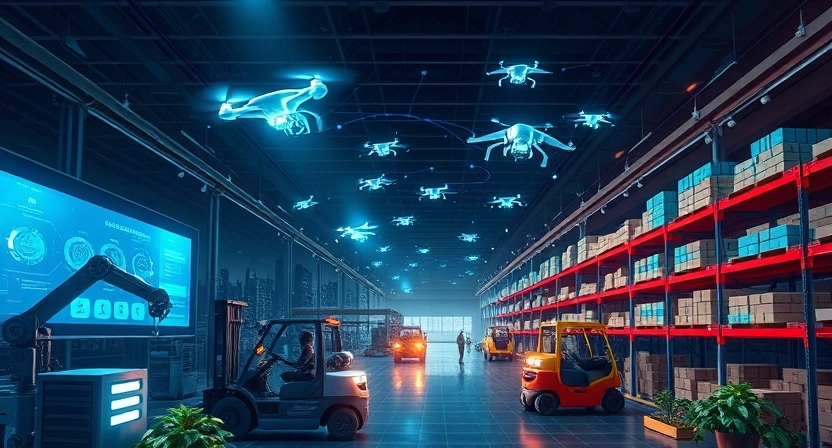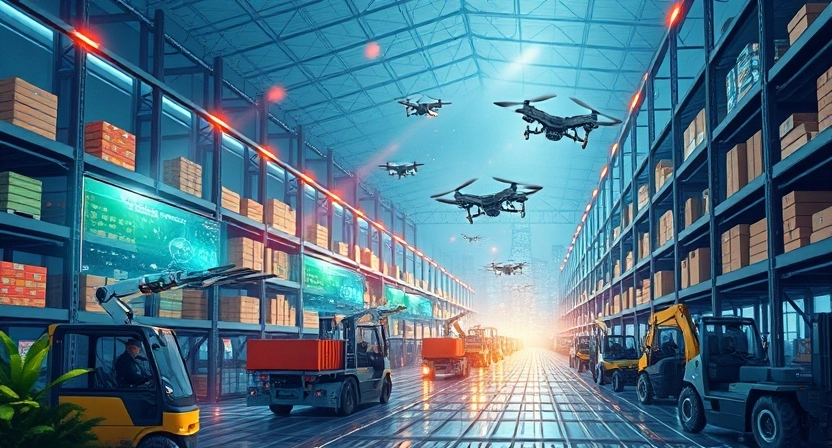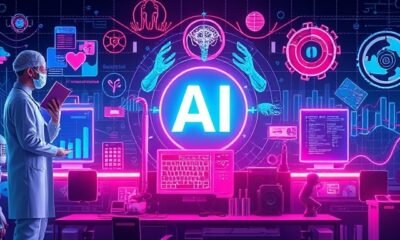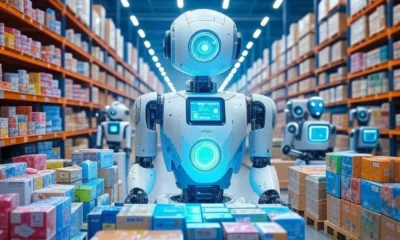Artificial Intelligence
What is artificial intelligence applications in supply chain management?

Artificial Intelligence (AI) is making significant changes in the supply chain management. It enhances business operations and choices for business entities. AI serves the purpose of keeping organizations competitive by increasing efficiency.
Definition of Supply Chain in Artificial Intelligence:
Supply chain AI involves applying technical advancement in processes to create improvements. It is inventory control, distribution and sales forecasting. AI is the ability of a machine to work on a large amount of data. It assists in making decisions that much more quickly and accurately with no need for the use of humans.
AI is very important for any organization that would wish to cut on the expenses they incurs while at the same time having to serve the customers in the best way possible. It facilitates decision making and appropriate response in conditions characterized by a high level of market dynamism. However, what tangible advantages does AI bring to supply chains in particular. How do these technologies work in application?

AI Applications in Supply Chain:
AI is very important in several fields of the supply chain. It assists an organization in making numerous changes to its operations, cutting expenditure and even improving customer satisfaction levels. That being said, let’s take a look at some of the core applications.
Demand Forecasting:
AI enhances demand forecasting as it involves use of past data to make forecasts. It becomes easier for the machine learning models to predict the demand in the future compared to traditional models. These models assist organizations to avoid stocking out and sometimes overstocking.
Machine learning forecasting engines are always updated and adapt the forecast to new data through formulas. This dynamic approach takes time to adjust the previous data set, making the work of inventory planning much more accurate.
Inventory Management and Optimization:
AI also eliminates cases of stockouts because it can determine when particular products will be out of stock. The predictive inventory tools are the real-time tools which helps to get the proper stock of the material and avoid any wastage. This helps in creation of stock buffers as a way of ensuring that the business has stocked the right amount of inventory at the right time.
Other usage of AI involves the tracking of inventory movements in supply chain management processes within the business. This helps businesses make sure that they do not stock a lot of raw materials yet they are expensive to keep.
Sourcing and Supplier Management:
Automated solutions help to streamline the choice of suppliers. These platforms rely on supplier information to provide recommendations on which supplier is performing well, at what cost, and how reliable the supplier is. It assists companies in making sound decisions about sourcing.
AI also helps in supplier relationship management by supplying information about the performance of the suppliers. This helps to develop companies’ relations and ensure that they do not face a risk of interruption to supply.
Warehouse Automation:
It is now common knowledge that the use of AI and robotics is revolutionizing the warehouse business. Picking, packing, and sorting are carried out by robots to provide higher speed and lower rates of mistakes made by employees. These processes are helped by AI in order to deliver increased efficiency and safety in the warehouse.
Applying AI into warehouse automation solves challenges of operations, minimizes costs and enhances the throughput rate. The AI-driven systems also have the aspect of real-time evaluation and control, thus making overall performance efficient.
Route Optimization and Logistics Management:
AI prevents delays in delivery services by making modifications on the routes chosen by examining traffic patterns and weather conditions as well as delivery schedules. It is useful for logistics managers to use machine learning algorithms to avoid the unnecessary consumption of fuel and time when delivering goods.
By the use of AI in supply chain and logistics networks, the supply chain becomes more transparent. This makes it possible for businesses to monitor the movement of goods in transit and manipulate data to achieve better service.
Predictive Maintenance and Equipment Downtime:
AI helps to identify equipment’s state and possible issues that may occur in the nearest future. Based on historical events and current sensor readings AI prevents equipment failures by scheduling maintenance ahead of time. This cuts on the unwanted breaks and the useful life of a particular equipment is increased.
This is especially true in the case of predictive maintenance with the help of AI where costs for a repair are definitely more than the costs of prevention. It makes sure that all equipments are well maintained thus no interruption of the supply chain.
Customer Service Enhancements:
AI based chatbots and assistants are making customer relations well served in supply chain organizations. They engage with the customers in real time providing them with the right answers to their questions and concerns. AI tools assist corporations in providing a much higher level of customer experience.
AI also enhances response speed in businesses and hence customer satisfaction in a business establishment. These tools also permit constant support that means customers can get aid no matter when they want it.
Generative AI in Supply Chains:
The idea of generative AI is gradually initiated as a potent weapon for supply chain revolution. Not only does it make sense in terms of saving time, but it opens up a new world of opportunities for development. But what is it and how is ai used in supply chain?
Role of Generative AI:
The generative AI is also used for better analysis and management of data. It generates new knowledge from large databases which were not previously visible. This assists the businesses in making the right decisions since they have fully understood the flow of their business.
Generative AI is also useful in creating solutions and also in the pursuit of business opportunities. They use the best and complex algorithm to come up with new innovations, how to make processes faster, and how to enhance products. This results in improved supply chain techniques and prospects for development.
GenAI Use Cases:
Therefore, to enable the integration of Generative AI into supply chains, the product funnel approach is essential. It covers the generation of new product concepts with the help of AI and testing of such concepts. This approach is used by businesses to determine opportunities for new product and solution offerings in the market.
The other use of generative AI involves legal document generation and responding to customer inquiries. It can type legal documents with the assurance of its correctness and legal requirement. Also, it is easy to integrate AI to answer customer questions, which will give prompt responses.
AI-Driven Transparency and Visibility:
The use of AI is actually transforming how transparent and visible supply chains are. AI helps to improve decisions and makes supply chains more robust by using the latter to show real-time information. To give you an idea on how AI enhances these fields, let’s discuss the following.
End-to-End Visibility:
Its use facilitates the tracking and management in real-time all the links of the corresponding supply chain. It monitors shipment, inventory and production status to facilitate efficient running of the company. This visibility enables businesses to solve problems before they turn into dramatic disruption.
Decision making with AI gives a supply chain manager the ability to make alterations to strategies. They can adapt where it is necessary and ensure they look for the best routes, relocate resources, or even look for another supplier so that they do not have to stop operations.
Transparency Beyond Tier 1 and Tier 2:
When integrated with AI, blockchain increases the level of supply chain traceability. It affords the assurance that information is safeguarded and authentic, which in turn provides business with positive assurance on their supply chain operations. Products can be traced from their source and to the final consumer through the use of blockchain technology.
These two technologies help to optimize all the tiers within the supply chain. They provide adequate information to businesses so that they can prevent such risks from happening and hence a secure chain of supply is established.
Challenges in AI Adoption for Supply Chains:
AI use for supply chain management is not without its problems. Managers encounter challenges which require strategization and solving in their businesses.
Data Quality and Volume Issues:
Data accuracy and consistency are critical to AI systems because they determine how the systems will perform. Bad data results in bad data insights and bad decisions being made. It is crucial for companies to concentrate on data cleaning and checking to get good input data to the systems.
Employee Skill Gaps:
Most employees don’t possess the technical and logistic skills that enable them to use AI tools productively. To meet this demand, businesses must learn and train their workforce in such programs.
Ethical and Security Concerns:
AI systems present ethical issues such as, data privacy and model bias. If not well managed, AI will lead to compromised customers’ trust and noncompliance. These risks suggest that organizations should ensure a high level of transparency, equity, and security.
Legal and Policy Barriers:
Lack of clarity pertaining to the use of AI system in supply chains is a major issue. There are legal barriers of data ownership and compliance added to it. It means that companies have to read laws regularly and involve professionals who specialize in that area to follow them.
Costs and Implementation Challenges:
AI is characterised by high fixed costs attributing to the costs of technology and other infrastructure. Implementation also interrupts the current process and makes it more intricate. The challenges can therefore be addressed through a careful approach of working with small scale AI projects that are gradually scaled up.
Smart Logistics and AI’s Role in Advancing Operations:
Logistics is being revolutionized through the integration of Artificial Intelligence in the processes. It enhances efficiency and promotes better decisions in its execution of business operations.
AI in Logistics:
Logistics has never been cheaper due to AI which simplifies complicated procedures. It assists the business organizations in the reduction of costs as well as enhancement of service delivery. Thus, through use of data analysis, AI is capable of providing insights for logistics management on real time decision making and forecasting.
Integration with IoT and Big Data:
AI enhances IoT applications and big data to promote enhanced logistics systems. Sensors along with analytics support real-time decision-making and hence their integration in the manufacturing systems is often beneficial. It enhances the control of stocks and flows of products, as well as organizational control over its product supply during the entire supply chain.
Automation and Robotics in Logistics:
It is now possible to note that automation and robotics are the important drivers of changes in the sphere of logistics with the help of innovative tools and systems. These technologies increase accuracy and productivity of the healthcare industry.
Self-Driving Vehicles and Automated Forklifts:
The current innovations in the automation of logistics are self-driving cars and automated forklifts. They enhance safety and rates of operations. All these applications are used to perform routine tasks so that human labor can be channeled towards more creative work.
AI-Driven Route Optimization:
AI reduces delivery time through re routing the vehicle based on traffic flow and other factors. This in a way cuts the lead time and the overall cost of operations. The use of AI algorithms adopted by the logistics manager enables one to make real-time adjustment in order to enhance the delivery.
Real-Time Traffic and Delivery Optimization:
Real time traffic information assists AI systems in planning routes in real time. This guarantees timely delivery and proper use of the fleets available. AI eliminates wasteful consumption of fuel and improves customer satisfaction since delivery times are most accurate.
Load Planning and Optimization:
AI improves load planning since it increases on the vehicle’s loading capacity and decreases cost. It also guarantees effective management of available resources. Shipment data is used by machine learning algorithms to reduce void factor and optimize operations.
Future of AI in Supply Chain and Logistics:
It can be projected that AI is to takeupply chain and logistics to the next level. New methods will make processes more effective and less damaging to the environment.
Upcoming AI Trends in Supply Chains:
AI is still on the forefront introducing advanced trends in supply chains. They are automation and use of environmentally friendly products.
Low-Touch and No-Touch Planning with AI:
AI means low touch and no touch planning in the organization where decision making is automated. This decreases the involvement of people and increases production rate. It helps that businesses can focus on relevant and meaningful business goals, while AI takes care of automatic, mundane, and constant tasks and optimizations.
AI for Sustainability and Green Logistics:
AI assists the companies in the application of sustainable solutions in the supply chain. It enhances fuel consumption and emissions of carbon as well. Sustainability supply chains incorporate the use of Artificial Intelligence to attain environmentally friendly supply chain and legal requirements.
Vision for 2028 and Beyond:
This paper aims to identify how the future of AI in logistics is going to revolutionize the sector. They are likely to alter the supply chains throughout the world.
Predictions for AI Advancements and Future Technologies:
AI will progress with even better algorithm and higher level machine learning. These innovations are going to enhance precision as well as the functionality of operations. Future technologies will be infused with predictive analytic and intelligent automation into key supply chain processes.
The Integration of Blockchain, IoT, and RPA in Supply Chains:
Supply chain management is set to become an ecosystem of systems enabled by AI, blockchain, IoT, and RPA. This is important to avoid any usual hitches that might result in the delay of the completion of the project. All these integrations will foster end-to-end visibility, secure transactions and; automation of the supply chain across the different tiers.
AI’s Impact on Sustainability:
Artificial intelligence is increasingly becoming essential in supply chain sustainability. It helps in the promotion of green logistics and also improves the ‘robustness’ of the operation.
Supporting Green Logistics:
AI could be of significant importance when it comes to increasing the use of green logistics practices in the market. They are useful in catalyzing innovation on sustainable programs.
AI for Carbon Footprint Measurement and Sustainability:
Hence, AI makes it possible to calculate carbon footprints for supply chain networks. It examines data in an effort to locate potential for enhancement. They enable business organisations to lower their emission levels and achieve their sustainability objectives.
Sustainability and Resilience in Supply Chains:
AI enables organisations to develop strong, protective, and sustainable supply chain management systems. It seeks to maximize on the utilization of resources and minimize the utilization of natural resources.
AI for Optimizing Resource Usage and Reducing Environmental Impact:
Therefore, AI is an ideal solution to resource management by studying the supply chain processes and cutting on efficiency loss. This in turns reduces the impact on the environment to a very minimal level. Sophisticated algorithms make it possible to develop more intelligent supply chain planning and make environmentally responsible decisions to help the future.
Key Industry Use Cases and Success Stories:
AI has been appreciated across various business sectors, and has provided an impressive number of success stories. But let’s consider its practical use and some of the success stories.
Real-World Applications:
Supply chain has been revolutionized for many organizations by AI, which brings new technologies to businesses.
Case Studies of Companies Using AI in Supply Chains:
Another interesting application of AI in Kimberly-Clark is demand forecasting wherein its ability to finish and raw material consumption is reduced and inventory levels around the world are improved. Supply chain management is another area where Tyson Foods use AI to gain better understanding of the chain and respond quicker to the changes on the markets.
AI in Army Logistics:
AI is a significant innovator in the military’s logistical operations, including flexibility and accuracy of the decision-making system.
Use of AI for Adaptive Logistics and Decision-Making:
The Army employs AI in supply chain forecasting and management to help the Army to determine what is needed and when. This makes running of the organization more efficient during essential operations. Big data is processed to identify changes and make quick adjustments in order to increase mission availability and capability.
AI in Production and Inventory Planning:
In production planning and maintenance of the inventory, AI makes the planning and use of resources efficiency and timely.
Case Studies of Manufacturing Optimizations Using AI:
AI is employed by leading manufacturing companies to manage schedules and minimize time off work. This leads to one of the major efficiencies of higher production at a lower cost. Other features of AI include effective control over inventory in that raw materials and products are adequately stocked depending on the demand.
Steps for Implementing AI in Supply Chain Management:
The application of AI in supply chain management planning cannot be a haphazard affair. These steps make the transition smooth and bring maximum benefits with it.
Audit and Strategy:
Several studies have pointed out that organizations must perform a proper evaluation of their AI potential and have a solid plan to implement AI into their supply chains.
Conduct Value Creation Audits:
The firms should then map their current processes to establish opportunities for using AI in order to get the most benefits. This step assists in ranking ideas and guarantee that resources are used as needed to have the most benefits.
Develop Roadmaps and Select AI Vendors:
Defining a clear plan reveals goals, schedules, and milestones for introducing AI. It is therefore important to choose the right AI vendors who specialize in the supply chain solution to help in the long run.
AI Integration and Change Management:
To ensure AI becomes integrated into operations naturally, a lot of considerations need to be made during the planning process.
Implementation and Adjustments for Seamless Integration:
Apply AI technologies step by step, so that teams could adjust to the new conditions where applicable, without interruptions. The method of constant consideration and fine-tuning guarantees AI solutions’ relevance to the constantly shifting objectives of a business.
Conclusion:
AI is one of the most impactful technologies to supply chains since its implementation. It brings improvement of operations, flexibility and sustainability into the operations functions.
Benefits in Supply Chains:
AI optimises decision-making, minimizes the expenses along with the customer satisfaction levels concerning the supply chain activities. These include applications in demand forecasting, inventory management, production planning, materials management, and distribution, all of which lead to improved operational flow and improved competitiveness.
Future Opportunities and Strategic Planning:
AI enables one to look for new solutions with new technologies like blockchain and IoT for supply chain transparency. Future benefits of using AI in supply chain businesses will be captured through effective strategic planning as well as early adoption of the technology.
Focus on Talent Development and Phased Adoption:
Nurture talent capable of building and implementing AI concepts to ensure the successful and sustainable integration of AI in supply chain management. Gradually adopting AI allows organizations to integrate it seamlessly without disrupting existing systems. Share your thoughts and join the conversation – how do you see AI shaping supply chains?
-

 Artificial Intelligence8 months ago
Artificial Intelligence8 months agoWhat is Artificial Intelligence? A Comprehensive Guide for Businesses and Enthusiasts
-

 Artificial Intelligence6 months ago
Artificial Intelligence6 months agoHow to Use Grok AI: A Complete Guide
-

 Artificial Intelligence8 months ago
Artificial Intelligence8 months agoUnlocking the Power of Artificial Intelligence Tools
-

 Artificial Intelligence7 months ago
Artificial Intelligence7 months agoWhat is DeepSeek? Revolutionizing AI with Cutting-Edge Solutions
-

 Artificial Intelligence3 months ago
Artificial Intelligence3 months agoAI Technologies in Warehouse Automation:
-

 Artificial Intelligence4 months ago
Artificial Intelligence4 months agoMeta’s AI Push: The Standalone Assistant App Set to Rival ChatGPT
-

 Artificial Intelligence3 months ago
Artificial Intelligence3 months agoHow Artificial Intelligence is Revolutionizing Logistics:
-

 Artificial Intelligence3 months ago
Artificial Intelligence3 months agoPredictive Analytics for Demand Forecasting:


